
M V O W S T O B U I L D A ‘ T E C H - D R I V E N
g REVEALS SAUDI ARABIA TO TRAIN PAKISTANI YOUTH IN AI, IT, AND MODERN TRADES, SAYING PAKISTAN ’S YOUTH WILL BE PARTNERS IN THEIR PROGRESS
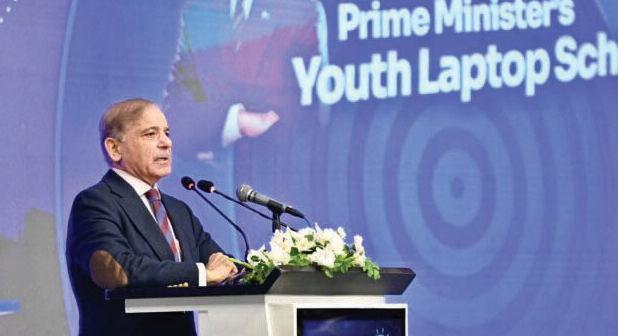
g SAYS RS500B EARMARKED FOR YOUTH EDUCATION, SKILLS, AND EMPOWERMENT, TERMING 2025 A MILESTONE YEAR FOR DIGITAL LEARNING AND INNOVATION
g SAYS OVER 100,000 LAPTOPS DISTRIBUTED SINCE 2011, VOWS LIFELONG SERVICE TO YOUTH AND CALLING THEM ‘ NATION ’S BRIGHTEST HOPE’
Naqvi, Omani Minister discuss deeper
cooperation
V
S
ISLAMABAD S ta f f R e p o R t Federal Minister for Interior Mohsin Naqvi on Thursday met Oman s Royal Minister General Sultan bin Mohammed Al Nu amani in Muscat to discuss ways to further deepen bilateral cooperation and address issues faced by the Pakistani community in the Sultanate During the meeting, the two leaders reviewed the state of Pakistan-Oman relations and held in-depth discussions on visa facilitation for Pakistani nationals living and working in Oman They also exchanged views on the evolving regional situation and agreed on the need for enhanced engagement and collaboration across multiple sectors Minister Naqvi underscored the deep-rooted religious, cultural, and historical bonds between the two brotherly nations noting that millions of Pakistanis were making valuable contributions to Oman’s growth and development He said easing visa procedures would open new avenues for skilled Pakistani professionals and strengthen people-to-people connectivity Pakistan is committed to expanding its partnership with Oman at all levels,” Naqvi affirmed, voicing optimism that bilateral cooperation would continue to grow in trade security and manpower development General Sultan bin Mohammed Al Nu amani reaffirmed Oman s enduring and brotherly relationship with Pakistan, stressing the importance of continued collaboration, mutual trust, and regional stability Meanwhile, the Interior Minister paid rich tribute to Pakistan’s security forces for their successful operations in Balochistan that resulted in the elimination of 18 Indian-sponsored terrorists Commending the professionalism and courage of the forces Naqvi said the timely action had foiled the nefarious designs of the Indian-backed proxy network, Khawarij “I salute the security forces for sending 18 terrorists to hell,” the minister remarked “We are proud of the bravery and professionalism of our officers and soldiers ” He said Pakistan s security institutions had achieved remarkable successes in the fight against terrorism and remained unwavering in their resolve to ensure lasting peace and stability in Balochistan and across the country
K h A sif sees ‘ray of light ’ in Pak-Afghan talks, urges c autious optimism
Defence Minister Khawaja
Muhammad Asif on Thursday said that a ray of light had emerged from the Istanbul negotiations between Pakistan and Afghanistan amid weeks of escalating border tensions urging guarded optimism for a breakthrough even as he cautioned that nothing conclusive could yet be stated
The minister s remarks came during an interview on a private TV channel hours after the second round of Pakistan-Afghanistan talks mediated by Turkiye and Qatar concluded in Istanbul The discussions, which began on Saturday, revolved around Pakistan s long-standing demand for decisive
action against terror groups launching attacks from Afghan soil, an issue that has kept the process deadlocked As of now there are some faint signs of progress Asif said noting that hope which had completely flatlined before, was beginning to reappear Different drafts are being exchanged for an eventual agreement You can say that some ray of light is visible; there is very guarded optimism Let s hope something concrete takes shape
He explained that the negotiations followed a step-by-step process “When one side agrees to a draft it’s sent to the other for review and amendments after which it comes back for further discussions, the minister elaborated
Acknowledging the diplomatic role of the mediators, Asif praised both Qatar and Turkiye, calling them “respected and trusted friends of Pakistan Turkiye openly supported us during our conflict with India and we value their opinion, he said, revealing that Turkish officials had persuaded the Pakistani delegation to stay in Istanbul when talks appeared to be collapsing They literally brought us back from the airport saying Let s try this again A certain kind of diplomacy is still ongoing, and various scenarios are being worked out ” When asked if the government expected a formal written agreement to emerge the defence minister was categorical: We are not backing off from that
18 indian-sponsored terrorists eliminated in two Balochistan iBos: iSPR
RAWALPINDI
S ta f f R e p o R t
As many as 18 Indian-sponsored terrorists were eliminated in a fire exchange with security forces personnel during two intelligence-based operations carried out in different areas of Balochistan, according to the military’s media wing A statement issued by the Inter-Services Public Relations (ISPR) said “On 28 and 29 October 2025 18 terrorists belonging to the Indian proxy Fitna al-Hindustan were killed in two separate operations in Balochistan
The ISPR said that an intelligence-based operation (IBO) was conducted in the general area of the Chiltan Mountains in the Quetta District on the reported presence of terrorists “During the conduct of the operation our own troops effectively engaged the terrorists location and after an intense fire exchange 14 Indian-
sponsored terrorists were sent to hell
“In another IBO was conducted in the general area of Buleda in Kech District where a terrorist hideout was busted and four terrorists were successfully neutralized the statement said
It added that weapons ammunition and explosives were also recovered from the killed terrorists, who remained actively involved in numerous terrorist activities
“Sanitization operations were being conducted to eliminate any other Indian-sponsored terrorists found in the area as the relentless counter-terrorism campaign under the vision Azm-e-Istehkam (as approved by the Federal Apex Committee on National Action Plan) by security forces and law enforcement agencies of Pakistan will continue at full pace to wipe out the menace of foreign-sponsored and -supported terrorism from the country, the ISPR statement concluded
PESHAWAR S ta f f R e p o R t
Chief of the Army Staff (COAS) Field Marshal Syed Asim Munir on Thursday reaffirmed that Pakistan desires peaceful relations with all neighbouring countries, including Afghanistan but made it clear that Islamabad will not allow its soil to be targeted or cross-border terrorism to be perpetrated from Afghan territory according to the military s media wing According to the Inter-Services Public Relations (ISPR), the army chief made these remarks during his visit to Peshawar where he held an extensive interactive session with a Jirga of tribal elders and received a detailed briefing at Headquarters 11 Corps The brief-
on the
security environment, operational preparedness, and the ongoing counterterrorism operations aimed at ensuring peace and stability along the PakAfghan border Field Marshal Munir emphasized that while Pakistan has extended diplomatic and economic
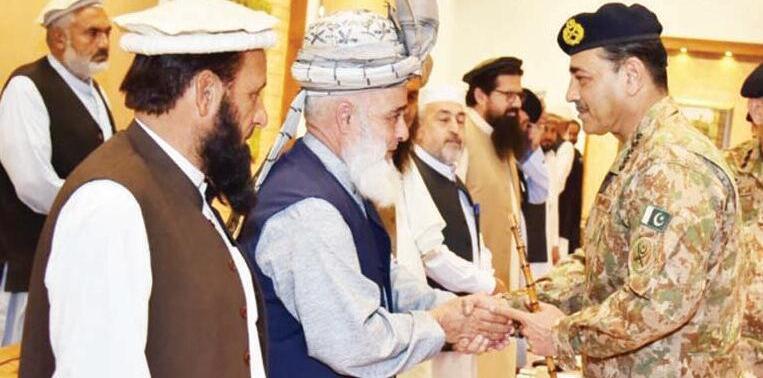

The suspension of food trade between Pakistan and Afghanistan for the past two weeks has halted the import and export of vegetables, fruits, dry fruits, and other essential goods sharply increasing food inflation in Rawalpindi and Islamabad markets Market data shows tomato prices have reached Rs450 per kilogram, garlic Rs600, ginger Rs800, peas Rs400, onions Rs180, and radish Rs150 Fruit prices have also risen steeply with Kandhari pomegranates selling at Rs450 per kg and grapes from Chaman surpassing Rs550 Traders said the closure of key border crossings including Chaman Torkham Kharlachi Ghulam Khan Bab-e-Dosti Kurram and both Waziristan routes, has disrupted the flow of Afghan produce, leaving hundreds of trucks stranded on both sides Many containers carrying perishable goods have reportedly spoiled Supplies from Afghanistan typically including tomatoes apples grapes, pomegranates, and dry fruits have stopped entirely despite being peak harvest season
OFIT N e w s D e s k The Collectorate of Customs (Appraise-
The suspension has driven domestic shortages, while recent floods have destroyed local crops, compounding the supply crisis Meanwhile chicken prices have declined due to the halt in poultry smuggling to Afghanistan but the costs of beef mutton milk and bread have risen Dairy
and
cluding cranes, loaders, excavators, tractors, and bulldozers He added that LiuGong also provides technical training to its partners in agricultural machinery and sugarcane harvesting technologies Haroon Akhtar emphasised the need for joint ventures between Pakistani tractor manufacturers and LiuGong to strengthen local production capacity and encourage technology transfer He said that integrating advanced
and
He



Sindh defers 45% agriculture income tax for one year, restores 15% rate through new ordinance
Rs2 4 million will pay 5%, and incomes up to Rs4 8 million will be taxed at 10% The maximum rate of 15% applies to income exceeding Rs4 8 million In contrast the federal tax structure imposes rates between 30% and 45% for comparable income brackets, along with a 10% surcharge at the top tier
According to officials this means agricultural income which accounts for about one-fourth of Pakistan s GDP will continue to generate only a few billion rupees in provincial taxes In comparison, salaried individuals paid Rs575 billion in income tax during FY2024–25 alone
The move aligns Sindh with Punjab, which last month issued a notification delaying enforcement of the higher rates until the next fiscal year
The Express Tribune cited a senior official from the Sindh Revenue Board who confirmed that the province followed Punjab s lead as both faced practical challenges in implementing the revised rates mid-fiscal year Under the ordinance the old progressive tax structure has been reinstated Farmers with annual income up to Rs1 2 million remain exempt from taxation, while those earning between Rs1 2 million and
Provincial governments had earlier committed to the IMF to align their agriculture income tax regimes with federal rates under the Extended Fund Facility The original plan required implementation from January 1, 2025, with tax collection starting in July 2025 However both Punjab and Sindh have now deferred enforcement by one year citing administrative difficulties and resistance from influential landowners represented in provincial assemblies
The new ordinance also gives the Sindh government executive authority to amend income tax rates through simple notifications by-
passing the provincial assembly The notification states that the government may revise schedules at any time during a financial year provided that such changes are later presented to the assembly during the next budget session
Furthermore, the ordinance allows the government to apply any future tax changes retrospectively “from any previous date specified in the notification a clause that analysts say could undermine transparency in provincial fiscal management
It remains unclear whether the IMF and World Bank were informed prior to the decision However officials involved in fiscal negotiations said that the lenders were aware of the implementation challenges but expected provincial governments to honor reform timelines agreed under the IMF program
With the new ordinance both Sindh and Punjab have effectively delayed the start of higher agricultural income tax rates to July 2025 pushing their practical enforcement to FY2025–26 Other provinces are expected to take similar measures, further postponing the federal government’s plan to integrate agricultural income taxation into the national fiscal framework
G h u l a m a b b a s
Federal Minister for National Food Security and Research Rana Tanveer Hussain has assured exporters that Kinnow (mandarin) exports to Uzbekistan will continue smoothly during the upcoming season, after disruptions in the previous year
During a meeting with Kinnow exporters led by Ahmed Khan of Milat Trading Company Quetta the minister said he would direct the concerned departments not to make fruit treatment mandatory for exports to Uzbekistan, as the importing country has no such requirement Ahmed Khan informed the minister that this year ’s Kinnow crop is expected to be bumper particularly in smaller sizes preferred in Central Asian markets and that Pakistan can export between 20,000 to 25,000 metric tons to Uzbekistan alone He added that further opportunities exist for expanding exports to other Central Asian countries provided trade routes remain open and border movement through Afghanistan continues smoothly throughout the season

Exporters emphasized that uninterrupted exports are essential this year, as the quality and quantity of Kinnow are both promising “The smaller-sized fruit is in high demand in Uzbekistan and Russia and we need to focus on these markets said another exporter Last year Kinnow exports to Uzbekistan faced disruptions due to administrative issues and controversy over export documentation, which led to an inquiry by relevant authorities Officials said measures have since been taken to ensure better coordination between exporters and regulatory departments to avoid a repeat of such problems
The food minister assured that the government is committed to facilitating fruit exporters removing unnecessary procedural hurdles and promoting Pakistan s agricultural products in new and emerging markets


Representing
TH E first oil imported from the USA has reached Pakistan as Pakistan works on balancing out its trade surplus with the USA in the least painful way It leaves the USA increasing its exports marginally with the sale of a primary product instead of the manufactured goods it seems it is no longer able to sell to the world The transaction is largely revenue-neutral, for the US oil, being imported at an international price, is going to be imported anyhow, so it merely means that the oil will not be imported from a more usual source That source so far has been the Gulf and as all the Gulf states are US allies none will dial down ties with Pakistan because of this One complication was highlighted when Saudi Arabia renewed the oil credit facility along with the rollover of its $5 billion in bank deposits American oil companies will expect payment in cash, because the purpose is not to give Pakistan aid, but to reduce its trade surplus Oil is obviously of great interest to US President Donald J Trump, whose tariffs Pakistan is trying to reduce by importing from the USA He, after all, is the originator of the slogan, drill, baby, drill with which he reversed the bans on drilling imposed because of their being behind climate change, which he described as a ‘con job’ to the UN He is also bent on getting India to stop buying discounted Russian oil because of which he had imposed a
evincing a deep interest in the sector Pakistan s relationship with the USA was once defined in geostrategic terms, but now is defined in geoeconomic ones There are the traditional avenues, such as oil and textiles, but new ones are opening, such as the US venture capital firm that wishes to spread stable coin in Pakistan There are other opportunities opening up with even a forecast that the USA might sell Pakistan arms Though that might reflect a return to geostrategic considerations it does have economic implications favouring the USA Under those circumstances, the oil import will prove crucial

Dedicated to the legac y of late Hameed Nizami Arif Nizami (Late) Founding Editor
M A Niazi Editor Pakistan Today Babar Nizami Editor Profit
TH E ceasefire between Afghanistan and Pakistan showed that this was a conflict that no one wanted, and merely was the result of Afghan miscalculation of how far it could go against Pakistan Pakistan s escalation of the conflict which had already been running at a sub-war level for some time showed that it would not tolerate the attacks on its soil directed against the armed forces
The reason for the conflict was not just the Tehrik Taliban Pakistan The Taliban did provide them safe havens a clear overestimation of their capabilities
Apart from the safe havens the TTP had free access to the US arms which had been left behind by the US forces when they scuttled from Afghanistan in 2021
Their use against Pakistan troops in the fighting around Dera Ismail Khan and Waziristan has been particularly painful since Pakistan has been making cautious moves towards mending fences with the USA
The Taliban may have overestimated the intentions of Pakistan It does not really wish to dominate Afghanistan the way the British did then the Soviets and most recently the Americans The three great empires foundered in Afghanistan because they first tried to achieve regime change, and then found themselves having to support the puppet they had installed Their inability to keep them in power is the result of the refusal of the Afghan people to accept them and thus to carry out the will of the imperial power British friction with Afghanistan was over the border, and because Afghanistan was not willing to allow Britain to exercise complete sovereignty over the area The first Afghan War occurred because Amir Dost Muhammad Khan wanted to receive a Russian diplomatic mission The British Government feared that Russia would invade India through Afghanistan and thus wanted an Amir who would not let them in Shah Shuja a grandson of the Father of Afghanistan Ahmad Shah Abdali and an ex-Amir, was willing to keep the Russians out, so long as he was allowed to invade Punjab (Maharaja Ranjit Singh was still alive) The’Army of the Indus’ invaded Afghanistan through the Bolan Pass in 1839 and succeeded in installing Shah Shuja on the throne But keeping him there was another matter and an ensuing rebellion in 1842 ended with the slaughter of all but a single British Army doctor who rode into Jalalabad (Other soldiers, but no officers arrived later) Britain had its revenge with another invasion of Afghanistan and it did bring Afghanistan firmly into the British sphere of influence Point made Dost Muhammad was allowed to return to the Afghan throne which he retained until his death in 1863 The Second Afghan War also owed itself to the Great Game The Afghan Amir, Sher Khan, accepted a Russian envoy in 1878 The British wanted to send an envoy too but the Afghans refused The envoy arrived nonetheless but was slaughtered in an uprising The British then took revenge sending in an
army Amir Sher Ali fled north but died His heir
was Yaqub Ali Khan but he abdicated and the British helped his cousin Abdur Rehman become Amir The War ended with the Treaty of Gandamak of 1879, when Amir Abdur Rehman conceded British control over Afghan foreign policy, as well as substantial territory in the south in what are now the Pushtun areas of Balochistan as well as Chitral which is now part of KP There was a Third Afghan War in 1919 in which the Afghan Army got beaten, but Afghanistan regained control of its foreign policy in the Treaty of Rawalpindi ending the war Afghanistan failed to regain its lost provinces and once again recognized the Durand line border since 1893 That War gave rise to a number of uprisings in Waziristan After that there has never been a prolonged clash across the Durand Line, though there have been incidents during the Soviet and US occupations of Afghanistan First the USSR occupied Afghanistan It tried to prop up the regime of Noor Muhammad Tarakki, who had himself overthrown Sardar Daud who had himself overthrown his cousin King Zahir Shah After Tarakkki was killed by his prime Minister Babrak Karmal who replaced him the Soviets brought in Najibullah Amin, who survived briefly after the USSR withdrew Ultimately, sometime after the Mujahideen took over Kabul, he was dragged out of the UN compound and hung from the nearest lamppost Earlier the USSR had withdrawn its forces in good order across the land border between the two countries Next came the USA which quickly occupied Afghanistan in 2001 after 9/11, but then spent the next two decades propping up Hamid Karzai and then Ashraf Ghani The USA finally had to withdraw, leaving Kabul in 2021 to the Taliban, but had to leave by air It suffered no major disaster to its forces such as the British suffered after the First Afghan War but still the withdrawal was not really in good order their former employees showing great desperation and fear of the Taliban The recent clash seems to resemble the Third War more than anything else There was no attempt at regime change because previous attempts have required a substitute which Pakistan does not really have In fact the present Taliban regime might be seen as the Pakistan nominees Following ancient tradition and not recent inspiration, Afghanistan is now an Emirate Then there is the Great Game Russia is no longer trying to invade, not even in the most fevered imagination However, Pakistan now faces the threat of India It has become more intense because of the Indian withdrawal from the Indus Basin Waters Treaty
Next came the USA, which quickly occupied Afghanistan in 2001 after 9/11, but then spent the next two decades propping up Hamid Karzai and then Ashraf Ghani The USA finally had to withdraw, leaving Kabul in 2021 to the Taliban, but had to leave by air.
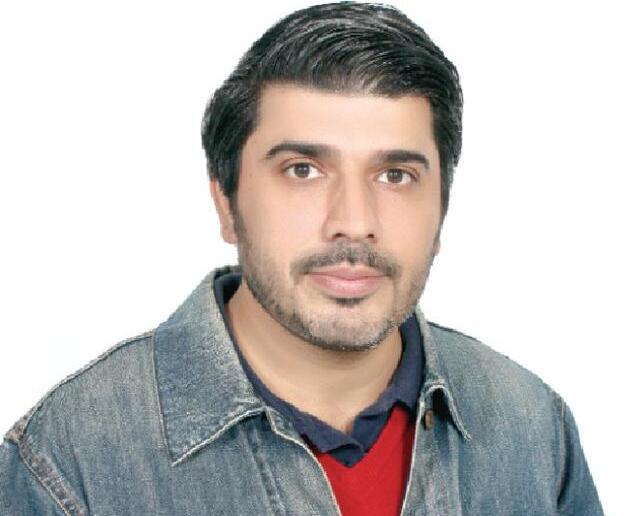

erations of self-preservation and personal happiness and satisfaction they would have perished as a species long ago There is nothing in all of this for anybody to be embarrassed about Of course, one motivation could be better than another; but to say that man can possibly act completely selflessly is an exercise in self-delusion Those who understand this save themselves the trouble of feeling obliged to be apologetic or defensive about Paradise being the major motivating force behind their efforts The Quran presents man precisely as he is–no more and no less No wonder, because who would know human nature best but its Creator! So it is that the reader can find almost on the same page of the Quran instructions regarding praying and those regarding using the toilet The latter is jarring for the sensibilities of those with unjustifiably lofty ideas about human nature (the human nature that is found nowhere except in their fertile imaginations) The Quran recognizes the human condition for what it is: with its need to use the toilet and to eat being no less important than considerations of prayers and earning an honest living In fact one common criticism of the Quran is that it is too practical to be a holy text Some have complained that it contains nothing more than common-sense As if that were a crime! The Quran states as a given that to be a human being is to be attracted to wealth comfort and other temptations of life Even the best of men and women are no exception to this
rule– only they opt for a wiser course of conduct than others after appreciating their susceptibility It is in this spirit that Islam forbids men and women from getting themselves into situations that, despite being apparently harmless in themselves are likely to make them overstep inviolable boundaries Similarly prohibition of liquor even in small quantities takes on board the fact that human nature being what it is once on this slippery slope it is only a matter of time before the individual will impair his senses and cloud his judgment The Quranic education is based on a realistic assessment of human nature as opposed to some utopian ideal that makes men coin pithy but hopelessly unrealistic slogans like Drink responsibly Imbibe in moderation and Do not drink and drive That is why its guidance is practical, effective and timeless Having too favourable a view of human nature is almost as calamitous as going to the other extreme and declaring man to be no different from animals While the latter assessment absolves man from any sort of accountability whatsoever unjustifiably rosy pictures of human nature form the foundation of philosophies that are bound to fail on account of being hopelessly naïve and utterly impractical The truth and the wisdom lies somewhere in between the two extremes That is man’s animalistic side being every bit as real as his rational and moral sides needs to be reckoned with It is only after acknowledging this that he can take the necessary steps to ensure that it is always reason that is in control
The author is a connoisseur of music literature and food (but not drinks) He can be reached at www facebook com/hasanaftabsaeed

The blackout bias


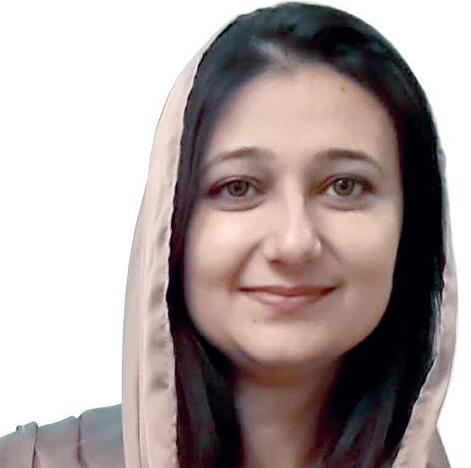
ernance in Gaza under a transitional “Board of Peace” and eventual self-administration but not the full sovereign state The plan is about demilitarization reconstruction and security guarantees and not about political sovereignty The plan bypasses long-standing international consensus as UN resolutions and the Arab Peace Initiative all call for a twostate solution on 1967 lines with East Jerusalem as the capital Here Trump s plan breaks with this consensus aligning instead with Israel s territorial claims Not only this, the plan risks legitimizing occupation and displacement Settlement blocs in the West Bank are effectively legitimized instead of dismantled Earlier drafts from Trump allies even floated ideas of relocating Palestinians out of Gaza whom Pakistan and other many countries strongly rejected that Palestinians fear is right that the plan could normalize permanent occupation rather than end it as this has happened many times earlier Every time a “peace initiative” comes without addressing core rights it ends up entrenching occupation instead of ending it Oslo Accords in 1993 cannot be forgotten in this regard when Palestinians accepted a staged process, hoping it would lead to a sovereign state within 5 years Instead that Israel expanded settlements, retained control over borders
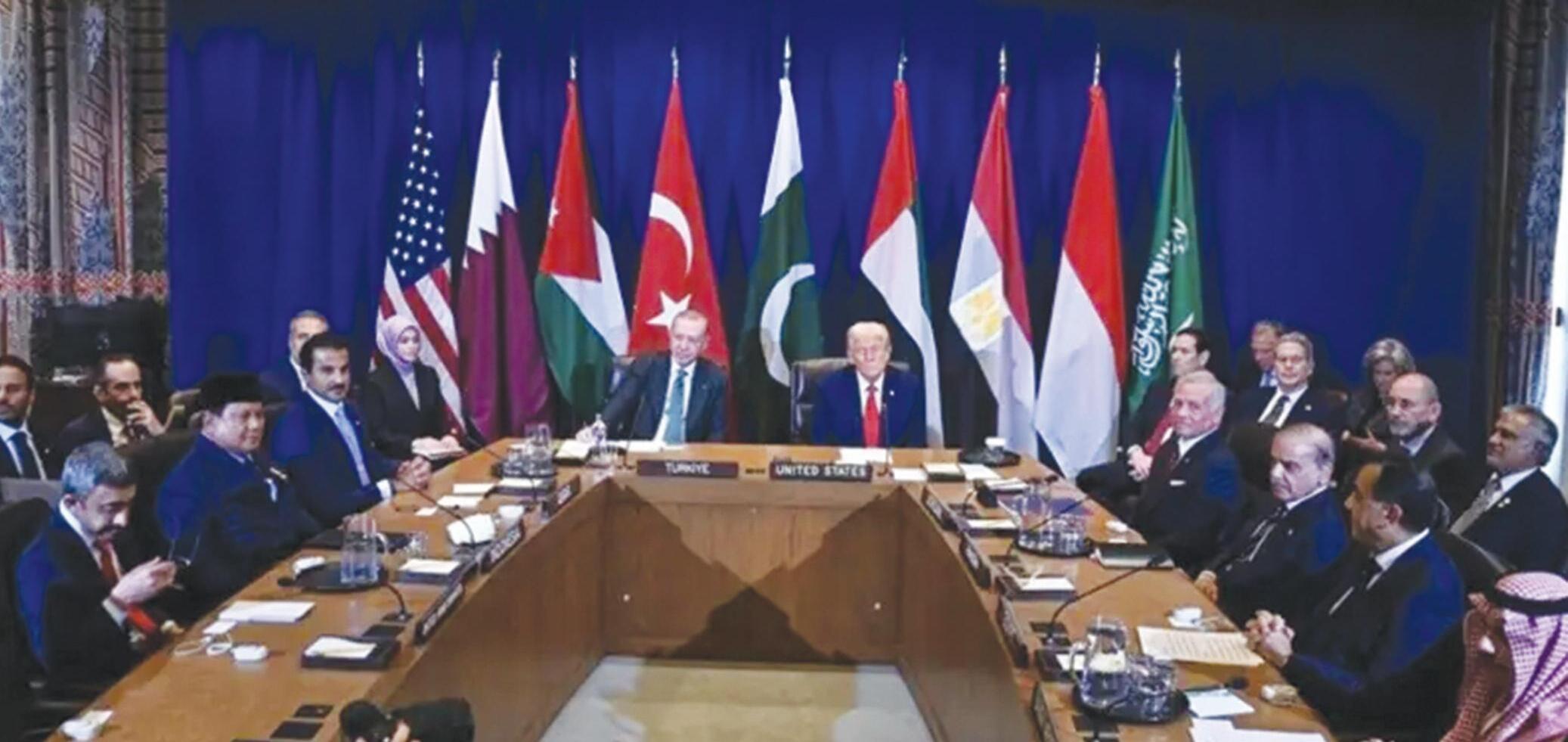
It is likely to stripping them of their right to a real state Moreover, the plan does not restore pre-1967 borders Instead, it accepts Israeli security control around Gaza and keeps Israel’s hold on settlements and most of the West Bank Palestinians are offered gov-
In the last two days news scenario reflects that though Pakistan cautiously welcomed „peace effor ts‰ but stressed that their core conditions like 1967 borders and East Jerusalem must be met. Pakistan emphasizes reconstruction with sovereignty and peace with justice When Trump unveiled the plan in January 2020, PakistanÊs Foreign Office issued a cautious but clear rejection.
Intelligence Minister Ismail Alkhatib revealed Tehran’s deepest fear during its recent 12- day confrontation with Israel and America: that the regime was battling blind, unable to distinguish patriots from traitors among its own ranks
The Asian grammar of power

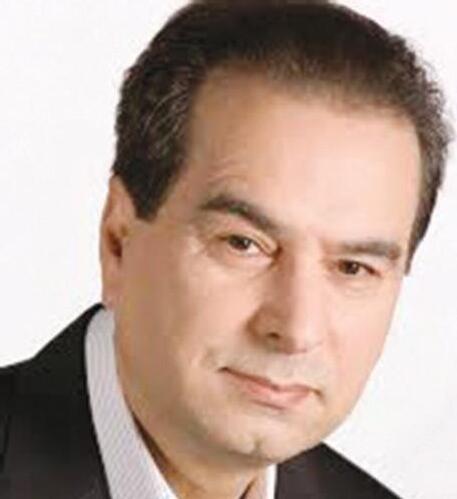
TH E war itself might have lasted twelve days Still, Iran will be living with its echoes for years, not with the missiles or the scorched targets, but with the knowledge that during those twelve days the regime discovered the enemy within: spies sabotage and assassination of the regime s key figures The spectre of penetration had shifted from legend into reality In a revealing Iranian radio interview, Intelligence Minister Ismail Alkhatib revealed Tehran s deepest fear during its recent 12-day confrontation with Israel and America: that the regime was battling blind, unable to distinguish patriots from traitors among its own ranks Alkhatib s admission of perhaps 50 intelligence agencies regional and international targeting Iran during the war with some 30 groups performing assassination and sabotage within Iranian territory alone in the first few days These facts reveal a horror of strategy that goes far beyond basic military arithmetic As onetime CIA Chief John Brennan once said “The most dangerous opponent is not the one who has more firepower but the one who knows your secrets before you use them The 12-day War presented an existential danger to Iran Worse still was the battlefield math Iran had endured decades of sanctions, proxy wars, and missile attacks Israel’s and America’s bombs were painful, but Iran’s greatest fear was not the explosion radius it was the inside job Senior commanders vanished or went AWOL A chilling tape came out in which an Israeli agent told an Iranian general in Farsi: You have 12 hours to flee with your wife and son The war as Tehran saw it, was never just on the outside The evidence filtered through the smoke Iranian lawmakers claimed Israeli drones had crossed over from Azerbaijan into Iran during the war Iran did not retaliate because it feared a greater conflict if Turkey intervened to protect Azerbaijan The vast geography that had once been a plus now seemed a minus THE PENETRATION PARADOX: Iran s leaders were faced with a historic test The country’s physical extent provided it with strategic depth against conventional attack and the missile capability demonstrated that Iran possessed the ability to inflict devastation on Israel But all these tactical advantages were meaningless if the regime could not count on its own institutions President Masoud Pezeshkian s frank remarks to journalists in New York discussing succession arrangements in the event of his assassination betray the paranoia in the power corridors of Tehran
The spectre of balkanization hung over Iranian
strategy With dozens of foreign intelligence agencies, joint operations, and domestic political and ethnic fault lines the Islamic Republic has been confronted with what intelligence thinkers call “systematic institutional compromise According to Georgetown University s Bruce Hoffman writing in his book on asymmetric warfare, When a state can no longer ensure the loyalty of its security apparatus, it has already lost the most important battle ”
THE AZERBAIJAN FACTOR: Most telling of all was Iran s restraint towards Azerbaijan even as there had been credible indications that drones and possibly fighter jets had originated from Azerbaijani airspace
This cautious non-action illustrates the regime s increased sensitivity to its weaknesses The Tehran leadership feared that attacking Azerbaijan would trigger Turkish intervention and turn a manageable crisis into a runaway regional conflagration
This constraint bears witness to what Israeli military commentator Yossi Alpher has called deterrence through anticipated escalation where the threat of spreading violence restrains military action more powerfully than the suffering of genuine battlefield loss Iran’s inability to strike back against attacks originating within its own border exposed not strength but immobility caused by the collapse of intelligence
THE NUCLEAR SHELL GAME: But Iran had one decisive advantage: nuclear foresight in its facilities Before the 13 June attacks, Tehran had relocated sensitive equipment and materials from accessible plants, so President Trump’s claims of dismantling Iran’s nuclear program were premature hyperbole This thinking-ahead action suggests that while Iran s intelligence network had been penetrated it had sufficient operational security for its most critical programs
MOSCOW’S MEDIATION: The dispatch of Iran’s National Security Council Secretary General Ali Larijani to Moscow only two days into the conflict revealed the desperation of the regime Carrying a letter from Supreme Leader Ali Khamenei to Russian President Vladimir Putin Larijani s trip brokered Russian technical assistance to rebuild the communications infrastructure that Israel destroyed As Russian analyst Mark Galeotti has written, “When Iran looks to Moscow for emergency repairs to its infrastructure it is not indicating alliance but dependence That Russia was able to provide immediate technical assistance fostered an umbilical while at the same time reminding Tehran of its vulnerability and isolation THE FUNDAMENTAL CALCULUS: Ultimately, Iran faced the ancient dilemma of warfare: Cui bono? Who benefits from prolonging the war? In inflicting quantifiable damage against Israel in precision-guided missile strikes Iran s strategists perceived an asymmetry in their favour against their adversaries With compromised intelligence networks, dubious military loyalty, and the spectre of regime overthrow by
uprising, Iran’s political calculation took a firm turn The regime could survive physical destruction but not institutional disintegration When American intermediaries and third
off-ramps Tehran acquiesced The decision to end the war was not based on military necessity, but on an intelligence disaster


US President Donald Trump is visiting Malaysia Japan and South Korea this week and enjoying another batch of spotlights as he usually does However many in Asia feel uncomfortable, and it is unclear whether he is communicating effectively with Asians He prides himself on being a smart realist, often invoking a tough, transactional style that he and his followers associate with Machiavelli Yet political traditions in Asia are different Many insist that power is most effective when it wins compassion from the people rather than mere obedience, and when it places legitimacy before spectacle and coercion If Trump is willing to listen, he will be far more likely to communicate effectively with Asians and achieve positive results from this tour In the Confucian world politics is not simply a technology for extracting compliance; it is a moral craft aimed at building trust The classics contrast two archetypes The politics of force relies on intimidation punishment and fear The politics of virtue relies on example, justice and benevolence The first may secure short-term concessions; the second consolidates longterm stability Confucius pictured the virtuous ruler as the North Star: steady unmoved by provocation and therefore a reference point that others naturally orbit The metaphor still resonates A leader who demonstrates self-control, fairness and respect does not need to shout His or her consistency is the message; the dignity is the policy When leaders embody credibility, attention arrives on its own Respect therefore is not a luxury sentiment; it is the operational core of durable rule Fear can halt dissent for a season but it cannot command devotion People may comply with what they resent yet they rarely defend it when it is threatened Respect grows when leaders demonstrate fairness to opponents, courtesy to partners and restraint toward the weak The goal is not to appear soft or weak; it is to be unassailable because one is recognized as just A ruler ’s dignity must rest on respect not fear and on trust not calculation That kind of dignity multiplies power because others choose to align with it Asian statecraft also insists that good policy depends on good timing Mencius said that success requires mastery of “heaven, earth and human harmony,” that is time space and morale Though he ranked harmony the highest the lesson also teaches that even a brilliant plan fails if pursued at the wrong moment or in the wrong place Modern
The best vic tories are those that make conflic t unnecessar y. A Chinese militar y strategist, S unzi, c alled

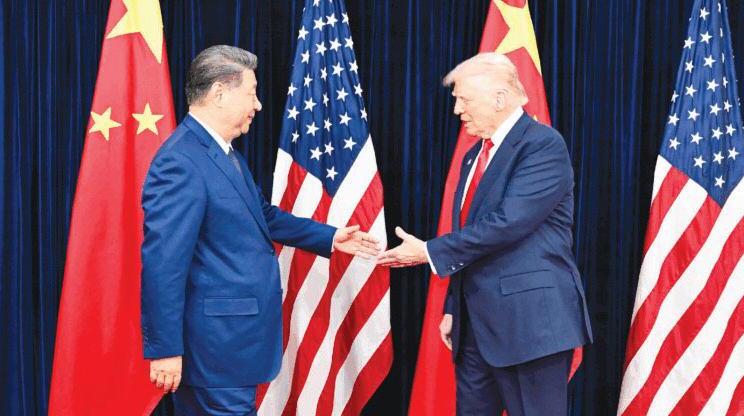

Israel kills 46 children, 20 women in strikes to ‘avenge’ soldier ’s death

rizing Gaza is ultimately achieved Israeli Prime Minister Benjamin Netanyahu said later on Wednesday during a visit to a military facility in southern Israel where US troops are monitoring the truce There is a real effort here in cooperation, with security being maintained in our own hands,” Netanyahu said, according to a statement released by his office In response to the soldier ’s death the military launched what it described as strikes targeting dozens of Hamas fighters across the enclave as well as weapons depots and tunnels belonging to the group It named 24 targets including one it described as a Hamas commander who took part in an attack on a kibbutz during the October 7, 2023, assault on southern Israel that ignited the war The Gaza health ministry said 46 children and 20 women were among the 104 people killed in the airstrikes The Hamas-run Gaza government media office issued a statement saying Israel s list of targets was a product of a “systematic campaign of misinformation, forgery, and
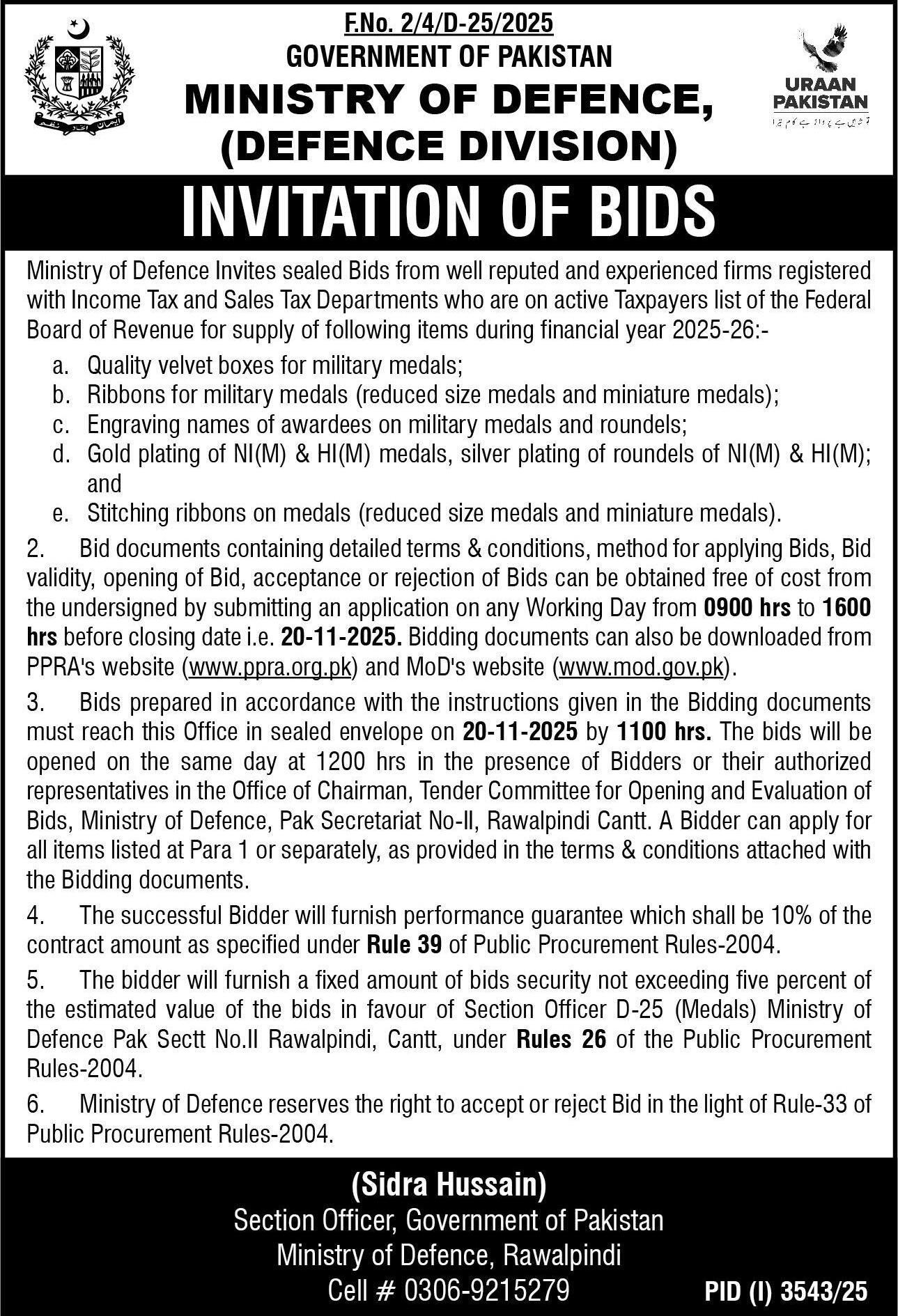
Trump


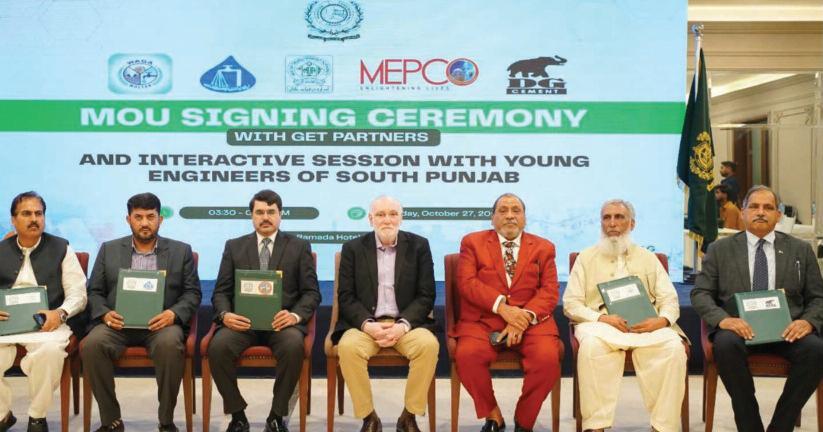


Cross-Countr y Vintage Car Rally Makes Stop at Murree Brewer y on Way to Peshawar
Wisdom Connects China and Pakistan: NAVTTC launches Pakistan, China welders training program

13,700 smoke-emitting vehicles, while more than 21,000 vehicles were penalized for not possessing valid fitness certificates and 5,600 vehicles were fined for operating without tarpaulin covers In addition more than 3 000 vehicles were impounded during the anti-smog drive in October CCPO Lahore Bilal Siddique Kamyana stated that stern action is being taken against vehicles, factories, brick kiln owners and individuals responsible for causing smog, including those engaged in burning agricultural residue He said that Lahore Police is extending full support to the relevant departments in their antismog operations The CCPO further mentioned that the Punjab Safe Cities Authority (PSCA) cameras are being utilized to identify and act against vehicles contributing to pollution


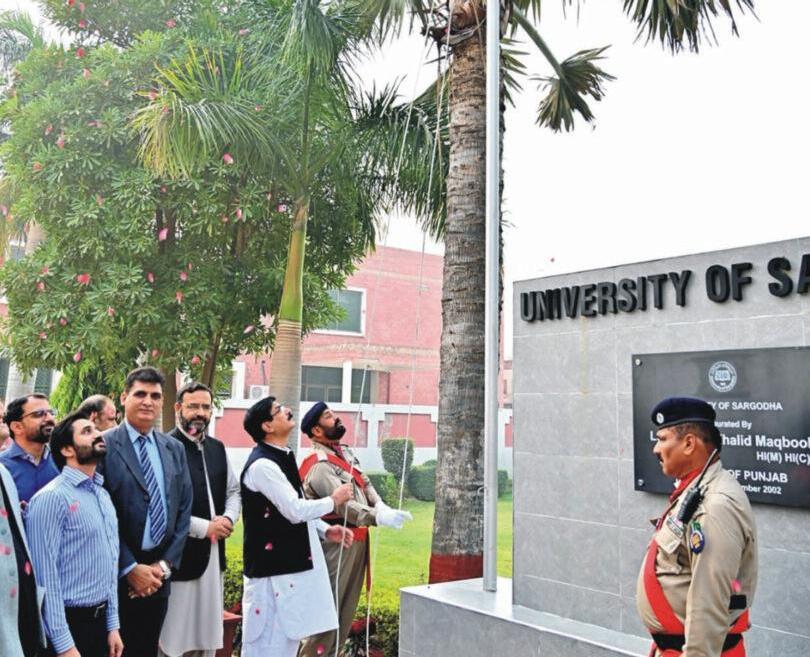
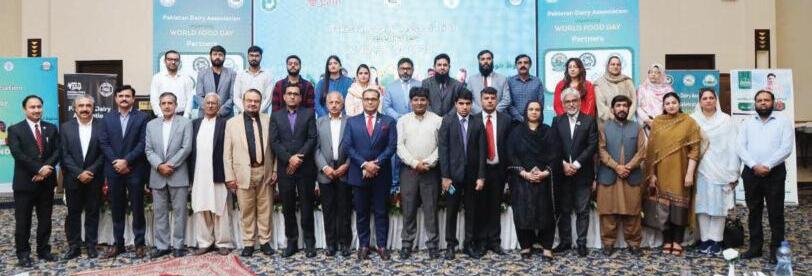



Pakistan will secure borders by force if cross-border attacks persist: Sanaullah

